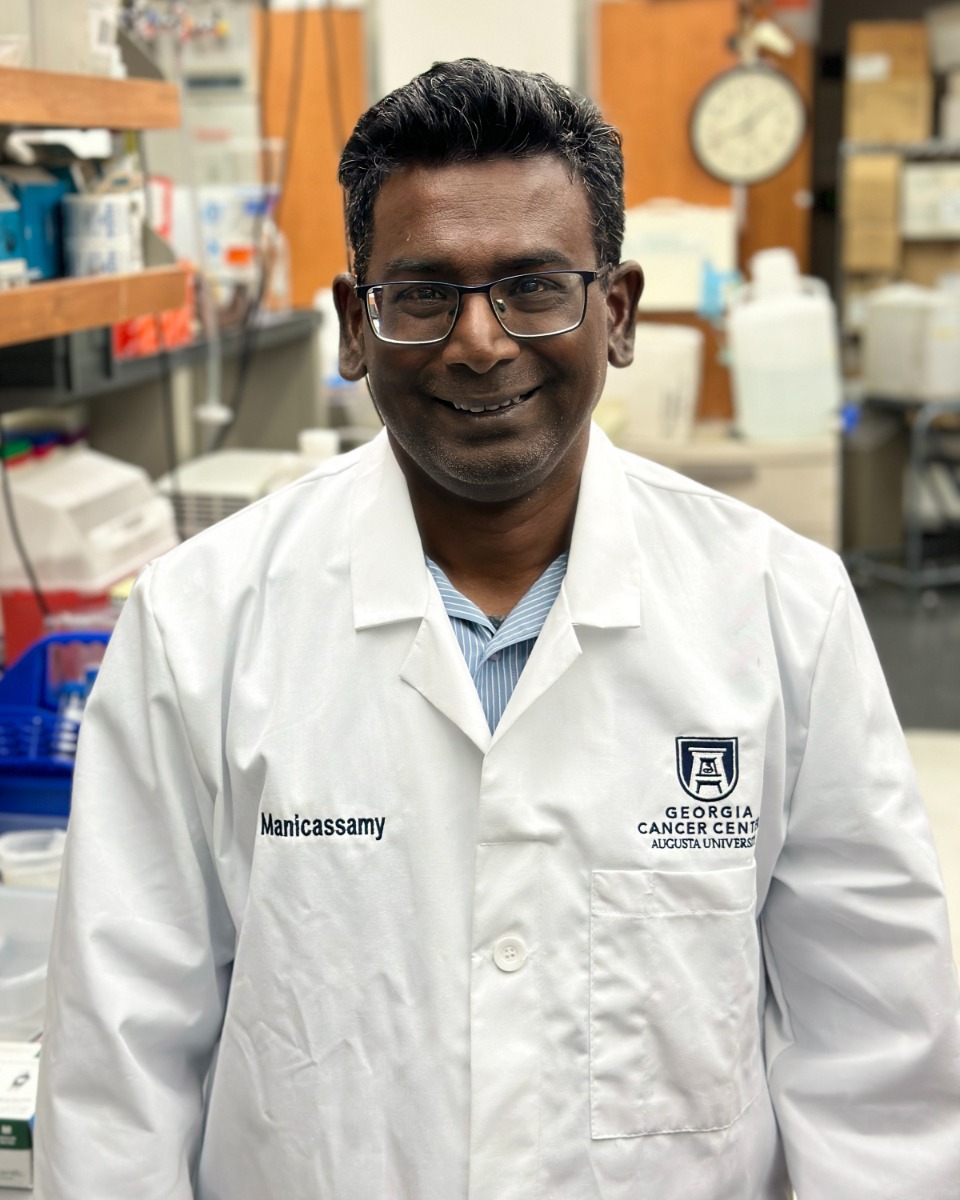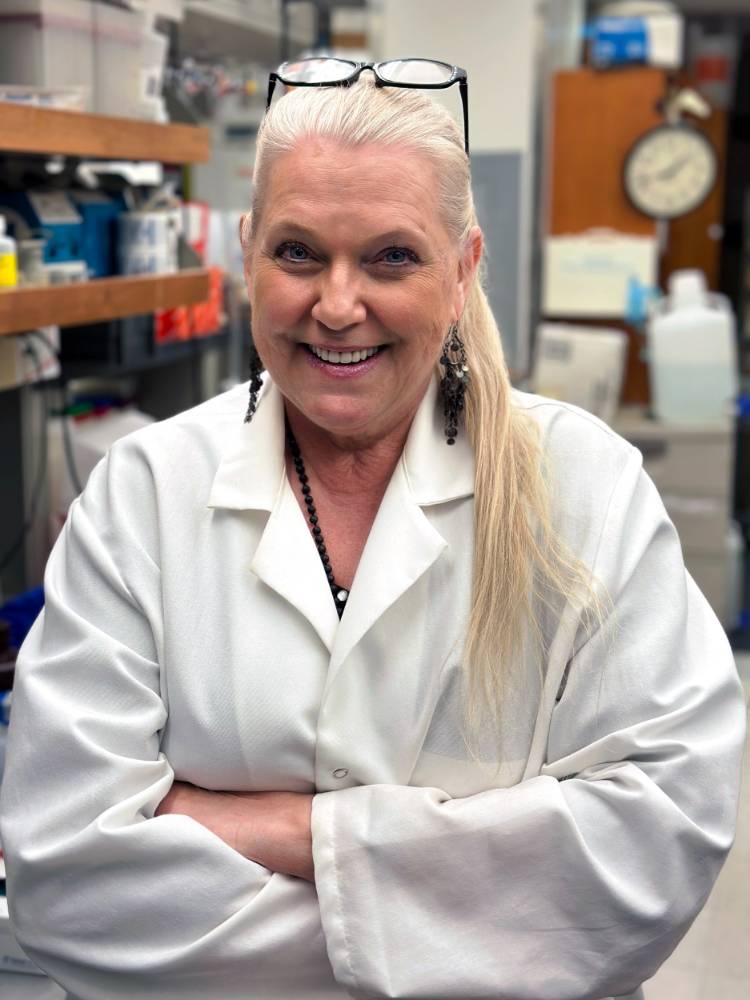
- Augusta University
- Georgia Cancer Center
- Research
- GCC Faculty Directory
- The Manicassamy Lab
The Manicassamy Lab
Santhakumar Manicassamy, PhD
Professor, Department of Medicine
Research Summary
Dr. Santhakumar Manicassamy is a professor at the Medical College of Georgia and the Georgia Cancer Center at Augusta University. He received his undergraduate and a graduate degree from Pondicherry University, India, and his Ph.D. from the University of Illinois, Chicago. He then did his post-doctoral work at the Emory Vaccine Center, Emory University, Atlanta. Dr. Manicassamy’s work focuses on understanding the molecular mechanisms by which innate immune cells shape adaptive immune responses, and harnessing such mechanisms to treat immune cell-mediated inflammatory diseases and in the design of novel vaccines against pathogens and tumors.
Contact Us
The Santhakumar Manicassamy Lab
Health Sciences Campus
GCC - M. Bert Storey Research Building
1410 Laney Walker Boulevard, CN415B1
Office: (706) 721-7902
Lab: (706) 721-7903
Research and Clinical Interests
Our research program focuses on understanding the molecular mechanisms by which innate immune cells shape adaptive immune responses and harnessing such mechanisms to treat immune cell-mediated inflammatory diseases and with the ultimate goal of developing novel therapeutic vaccines against respiratory pathogens and tumors. Some of our ongoing research projects are:
Innate control of anti-tumor immune responses
The immune system launches robust immunity against foreign antigens while maintaining a state of tolerance to self-antigens. Tumors express self-antigens that actively suppress host anti-tumor immune responses representing a fundamental barrier to cancer immunotherapy. Dendritic cells (DCs) are a specialized subset of antigen-presenting cells (APCs) that form a critical link between innate and adaptive immune responses. These APCs play a vital role in initiating immunity (immunogenic DCs) and suppressing immune responses (regulatory DCs). DCs are critical to inducing robust immune responses against a tumor. However, emerging evidence suggests that the tumor microenvironment (TME) reprograms DCs to a regulatory state, resulting in immune suppression against tumors. Many inflammatory pathways in DCs that augment anti-tumor immune responses have been identified. In comparison, less is known regarding the endogenous regulatory pathways in DCs, which suppress immune responses against the tumor's tumor-associated antigens (TAAs). Thus, identifying these regulatory pathways in APCs will help identify new targets for therapeutic manipulation to augment immune cells' quality and function that infiltrate the tumors. The tumor microenvironment (TME) contains high levels of the Wnt family ligands, and aberrant Wnt-signaling occurs in many tumors. While most studies are focused on how the Wnt signaling cascade regulates cancer development, progression, and metastasis, its effect on host anti-tumor immunity and tumor-induced immune tolerance remains unknown. We showed that Wnt-mediated activation of β-catenin in DCs induces retinoic acid production and suppresses immune responses against tumor-associated antigens (TAAs). We are currently investigating the downstream effector mechanisms by which the canonical Wnt and RA-RXR pathways in APCs suppress host immune responses against tumors. The information gained from these studies will provide a fundamental mechanistic foundation for the therapeutic manipulation of the RA-RXRα and β catenin/TCF pathway, specifically targeting DCs to enhance anti-tumor immunity.
Innate control of chronic inflammation and autoimmunity
Loss of immune tolerance to self-antigens, food antigens, and gut flora leads to chronic inflammatory diseases (CIDs) and autoimmunity. CIDs affect 4-5% of the population, and the prevention and treatment of CIDs are a significant clinical problem. However, molecular targets for therapeutic immune intervention remain elusive. Inflammation plays a crucial role in the pathogenesis of CIDs. Thus, there is a critical need for understanding the cellular and molecular mechanisms of immune regulation to self-antigens that may have a significant therapeutic impact in treating CIDs. In CIDs, antigen-presenting cells (APCs) lose their regulatory properties, resulting in uncontrolled chronic inflammation. We know very little regarding the endogenous regulatory pathways in APCs that suppress inflammation and autoimmunity. In this context, our recent findings show that the regulatory canonical Wnt signaling pathway in APCs plays a critical role in controlling chronic inflammation and inflammation-associated tissue injury. We are currently investigating the downstream effector mechanisms by which the canonical Wnt pathway and associated other related immune regulatory pathways in APC subsets act to suppress chronic inflammation and prevent autoimmunity.
Modulation of systemic immune responses by gut microbiota
Emerging data suggest that immune cells are critical in shaping the microbial composition in the gut. Accumulating evidence also suggests that gut microbiota can regulate the local intestinal immune system and profoundly influence systemic immune responses. Additionally, altered commensal microflora is associated with loss of immune tolerance to food antigens, chronic systemic inflammation, and autoimmunity. How instructive signals from commensal microflora shape innate and adaptive immune responses at systemic sites are unknown. In this context, we are currently investigating mechanisms by which APCs regulate commensal homeostasis and its influence on systemic immune responses.
Innate control of adaptive immune responses to mucosal pathogens
Early innate immune responses to infectious agents largely determine the outcome of the host's infection and survival. The innate immune system relies on a diverse array of receptors such as TLRs, C-type lectin receptor (CLRs), RIG-I like receptors (RLRs), and Nod-like receptors (NLRs) that can recognize a wide range of microbial structures and activate innate immune responses in a variety of cells, including DCs. The primary goals are to understand how APCs' Wnt pathway shapes innate and adaptive immune responses against mucosal pathogens such as influenza virus, Salmonella, and Candida albicans. These studies will help in the generation of better vaccine strategies to enhance immunity against pathogens.
Selected Publications
Publications below are selected from a total of over 48 publications; full publication list can be found on the National Library of Medicine's website.
Manoharan I, Swafford D, Shanmugam A, Patel N, Prasad PD, Mohamed R, Wei Q, Dong Z, Thangaraju M and Manicassamy S*. (2022). Genetic deletion of LRP5 and 6 in macrophages exacerbates colitis-associated systemic inflammation and kidney injury in response to intestinal commensal microflora. Journal of Immunology (Accepted).
Manoharan I, Swafford D, Shanmugam A; Prasad PD, Thangaraju M and Manicassamy S (2021). Activation of Transcription factor 4 (TCF4) in Dendritic Cell controls Th1/Th17 responses and autoimmune neuroinflammation. Journal of Immunology. 207(5):1428-1436. (Featured: This article is featured in Top Reads in the Journal of Immunology, p.1223. “DC regulator limits neuroinflammation”.)
Manoharan I, Prasad PD, Thangaraju M and Manicassamy S (2021). Lactate dependent regulation of immune responses by dendritic cells and macrophages. Front Immunol. 2021 Jul 29;12: 691134.
Swafford D, Shanmugam A, Ranganathan P, Manoharan I, Hussein MS, Patel N, Sifuentes H, Koni PA, Prasad PD, Thangaraju M, Manicassamy S. (2020). The Wnt-β-Catenin-IL-10 Signaling Axis in Intestinal APCs Protects Mice from Colitis-Associated Colon Cancer in Response to Gut Microbiota. Journal of Immunology. 205(8):2265-2275.
Vogel OA, Han J, Liang CY, Manicassamy S, Perez JT, Manicassamy B. (2020) The p150 Isoform of ADAR1 Blocks Sustained RLR signaling and Apoptosis during Influenza Virus Infection. PLOS pathogen. Sep 8;16(9):e1008842. (PMID: 32898178)
Swafford D, Shanmugam A, Ranganathan P, Hussein M, Prasad PD, Thangaraju M, Manicassamy S. (2018). Canonical Wnt Signaling in CD11c+ Antigen Presenting Cells Regulates Microbiota-Induced Inflammation and Immune Cell Homeostasis in the Colon. Journal of Immunology.
Ranganathan P, Shanmugam A, Swafford D, Suryawanshi A, Bhattacharjee P, Hussein MS, Koni PA, Prasad PD, Kurago ZB, Thangaraju M, Ganapathy V, Manicassamy S. (2018). GPR81, a cell-surface receptor for lactate, regulates intestinal immune homeostasis and protects mice from experimental colitis. Journal of Immunology 200 (5): 1781-89.
Suryawanshi A, Manoharan I, Hong Y, Swafford D, Majumdar T, Taketo MM, Manicassamy B, Koni PA, Thangaraju M, Sun Z, Mellor AL, Munn DH, Manicassamy S. (2015) Canonical Wnt signaling in dendritic cells regulates Th1/Th17 responses and suppresses autoimmune neuroinflammation. J Immunol. 2015 Apr 1;194(7):3295-304. (Featured in Journal of Immunology, p.2957. “Wnt Winds Down Neuroinflammation” ( rated as top 10% in JI)
Hong Y, Manoharan I, Suryawanshi A, Majumdar T, Angus-Hill ML, Koni PA, Manicassamy B, Mellor AL, Munn DH, Manicassamy S. β-catenin promotes regulatory T-cell responses in tumors by inducing vitamin A metabolism in dendritic cells. Cancer Res. 2015 Feb 15;75(4):656-65.
Manicassamy S, Reizis B, Ravindran R, Nakaya H, Salazar-Gonzalez RM, Wang YC, Pulendran B. Activation of beta-catenin in dendritic cells regulates immunity versus tolerance in the intestine. Science. 2010 Aug 13;329(5993):849-53. (Featured in: Beta-catenin balances immunity. Science (2010); β-catenin calms gut. Nature Reviews Immunology (2010); β-catenin: does it have a role in tolerance? Immunotherapy (2011). This manuscript was highlighted 8 times and received a Faculty of 1000 Exceptional rating of 20. The Scientist rated this article as top 7 immunology papers in F1000.)
Manicassamy B, Manicassamy S, Belicha-Villanueva A, Pisanelli G, Pulendran B, García-Sastre A. Analysis of in vivo dynamics of influenza virus infection in mice using a GFP reporter virus. Proc Natl Acad Sci U S A. 2010 Jun 22;107(25):11531-6. (Featured in: NIH research matters; NIAID health & Research; Highlighted in Faculty of 1000)
Manicassamy S, Ravindran R, Deng J, Oluoch H, Denning TL, Kasturi SP, Rosenthal KM, Evavold BD, Pulendran B (2009). Toll-like receptor 2-dependent induction of vitamin A-metabolizing enzymes in dendritic cells promotes T regulatory responses and inhibits autoimmunity. Nature Medicine 15(4): 401-9. (Featured in: Highlighted in Cell (2009); Journal of Investigative Dermatology (2009); Highlighted 6 times in Faculty of 1000).
Pulendran B, Tang H, Manicassamy S. Programming dendritic cells to induce T(H)2 and tolerogenic responses. Nat Immunol. 2010 Aug;11(8):647-55. (Featured: Highlighted in Faculty of 1000)
Manicassamy S, Pulendran B. Modulation of adaptive immunity with Toll-like receptors. Semin Immunol. 2009 Aug;21(4):185-93. (Featured: Top 10% of the reviews published in Seminars in Immunology)
Research Team
